#Koran
Text
Time Travel Question 34: Medievalish and Earlier 3
These Questions are the result of suggestions from the previous iteration.
This category may include suggestions made too late to fall into the correct earlier time grouping. Basically, I'd already moved on to human history, but I'd periodically get a pre-homin suggestion, hence the occasional random item waaay out of it's time period, rather than reopen the category.
In some cases a culture lasted a really long time and I grouped them by whether it was likely the later or earlier grouping made the most sense with the information I had. (Invention ofs tend to fall in an earlier grouping if it's still open. Ones that imply height of or just before something tend to get grouped later, but not always. Sometimes I'll split two different things from the same culture into different polls because they involve separate research goals or the like).
Please add new suggestions below if you have them for future consideration. All cultures and time periods welcome.
#Old English#Middle English#Linguistics#Vikings#North American History#Time Travel#Early Middle Ages#Indigenous History#Prester John#Middle Ages#Koran#Greenland#King Olaf#Arthuriana#Post Roman Britain#Heian Era Japan#Japanese History#Rapa Nui#Ammonites
129 notes
·
View notes
Text

#palestine#gaza#free palestine#free gaza#genocide#gaza under genocide#freegaza#freepalastine🇵🇸#freepalestine#gaza strip#quran#koran
64 notes
·
View notes
Text
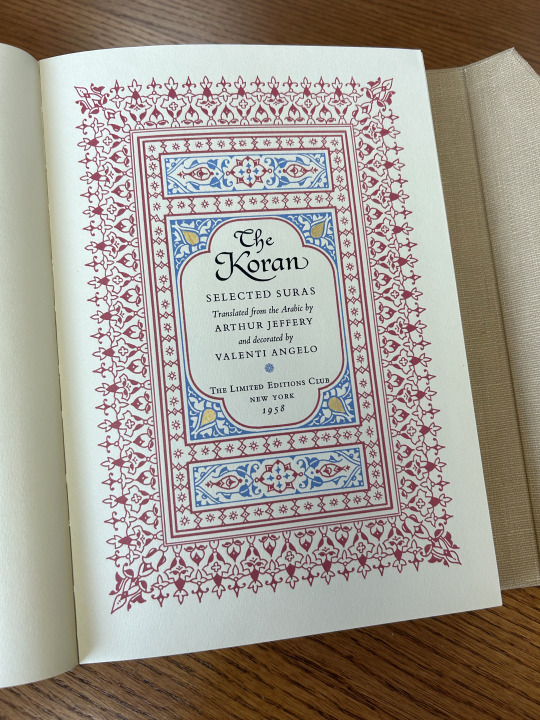


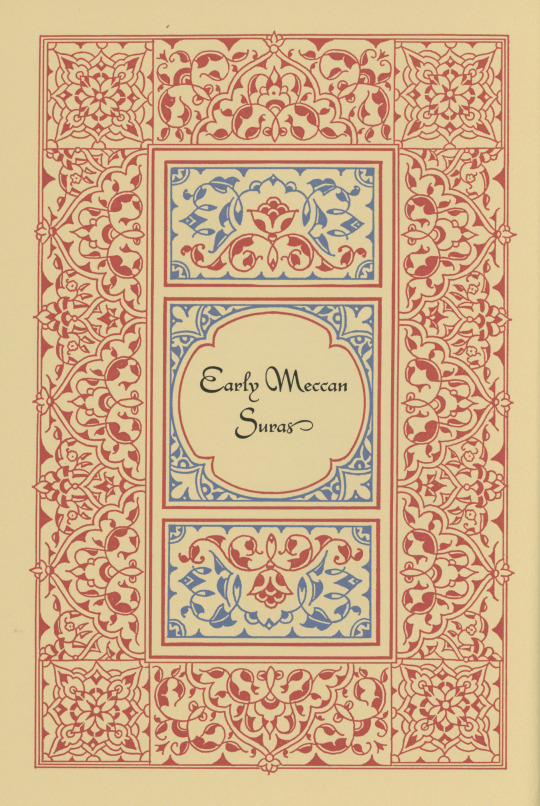
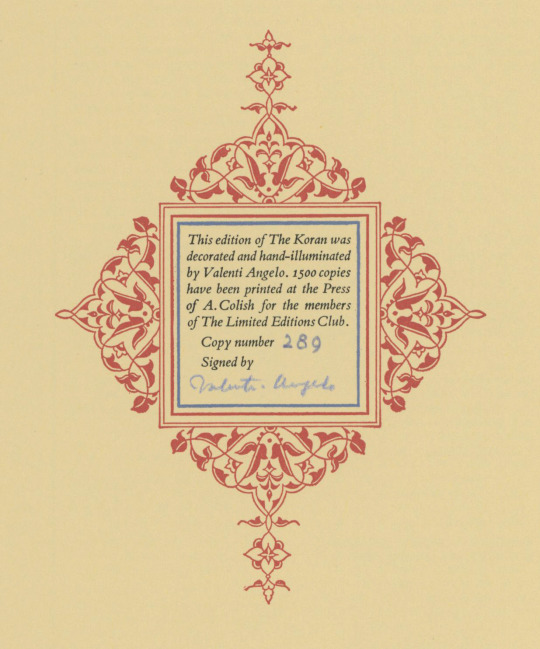

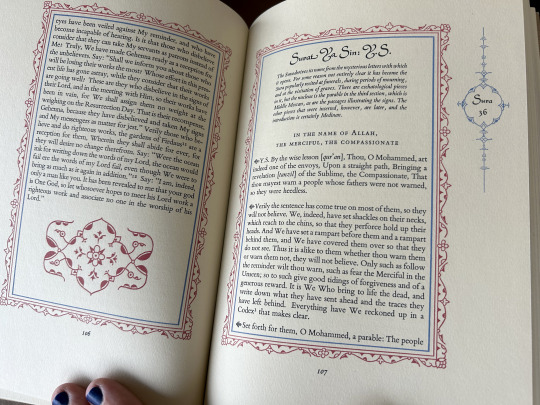
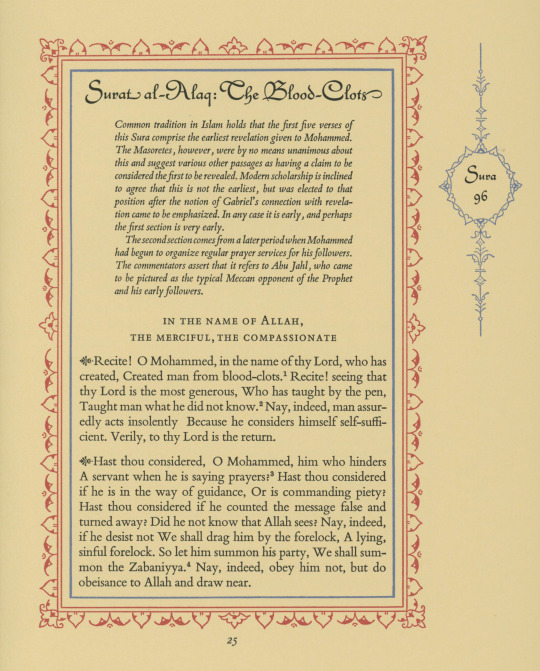


It’s Fine Press Friday!
This week, in honor of Ramadan, we’re taking a peek at a 1958 Limited Editions Club (LEC) publication of The Koran: Selected Suras from our collection. This modern, handsomely bound and illustrated collection of texts from the Qu‘ran was translated into English by Australian American scholar of Asian studies Arthur Jeffery (1892-1959), and features decorations in grayed blue and red ink from Italian American printmaker, illustrator, and author Valenti Angelo (1897-1982). The title page and the page opposite the opening sura were also hand-illuminated in gold by Angelo. The text, which features Bembo type and Civilité headings, is printed in black ink on custom made tan Arak paper from Curtis Paper Company, a paper mill in Newark, Delaware known for its manufacture of high-quality rag papers using 19th-century Fourdrinier machinery. The work was printed by Abraham Colish (1882–1963, otherwise known as A. Colish) and bound in cloth covered boards which were hand stamped with decorations in blue, red, and gold. It was released in an edition of 1500 copies, all of which were signed by the illustrator.
رمضان مبارك (Ramadan Mubarak)
Find more materials related to the Quran (including original manuscripts and alternate translations in Latin, French, and German) in UWM’s Special Collections
View more Fine Press Friday posts
View another Ramadan post
View more Bembo and Civilité posts
View more Valenti Angelo posts
View more A. Colish posts
View more Limited Editions Club posts
-- Ana, Special Collections Graduate Intern
#Ramadan#Fine Press Fridays#Quran#Koran#Limited Editions Club#Valenti Angelo#Arthur Jeffery#Bembo#Civilité#Curtis Paper Company#Press of A. Colish#Ramadan Mubarek#Ana
44 notes
·
View notes
Text










친절한 금자씨 // Lady Vengeance (2005)
#Lady Vengeance#Chinjeolhan geumjassi#Park Chan-wook#cinema#Lee Young-ae#Choi Min-sik#Kwon Yea-young#koran#2000s
30 notes
·
View notes
Text


23 notes
·
View notes
Photo

There are many different ways to translate a text. There is no one correct way. You should pick a translation that prioritises what’s important to you.
Just don’t confuse it for the one true inerrant word of your god.
44 notes
·
View notes
Text
الرقية الشرعية للعين والحسد,علاج العين والحسد,
العين,الرقية الشرعية,الرقية,السحر,الحسد,نور ذكر الله,
علاج السحر,علاج السحر والعين,رقية شرعية للدراسة,rokia charia,الرقيه الشرعيه,koran,رقيه للدراسه,رقيه شرعيه للدراسه,
رقية شرعية للعين والحسد والسحر,رقية شرعية للعين والحسد والسحر في الدراسة,
رقية شرعية للعين والحسد والسحر للدراسة,رقية للدراسة والنجاح والتركيز,رقية للعين والحسد الدراسة,في الدراسة,رقيه للدراسه من الحسد
#الرقية الشرعية للعين والحسد#علاج العين والحسد#العين#الرقية الشرعية#الرقية#السحر#الحسد#نور ذكر الله#علاج السحر#علاج السحر والعين#رقية شرعية للدراسة#rokia charia#الرقيه الشرعيه#koran#رقيه للدراسه#رقيه شرعيه للدراسه#رقية شرعية للعين والحسد والسحر#رقية شرعية للعين والحسد والسحر في الدراسة#رقية شرعية للعين والحسد والسحر للدراسة#رقية للدراسة والنجاح والتركيز#رقية للعين والحسد في الدراسة#في الدراسة#رقيه للدراسه من الحسد
17 notes
·
View notes
Text
ايات ابطال السحر علاج السحر و فك السحر بسرعة شديدة بإذن الله
السحر هو عمل من أعمال الشيطان، يقصد به الضرر بالإنسان، سواء في بدنه أو ماله أو أهله أو رزقه.
علاج السحر يختلف باختلاف نوع السحر، ولكن هناك بعض الطرق العامة التي يمكن اتباعها لعلاج السحر بسرعة شديدة، منها:
قراءة القرآن الكريم والرقية الشرعية بصوت مرتفع. الصلاة والدعاء بكثرة. الحجامة.
تعرّف على أيات قوية لإبطال السحر وتحقيق الشفاء
كيفية استخدام أيات معينة للتصدي لتأثيرات السحر والتخلص منه
أيات مجربة في فك وعلاج السحر بفعالية
أيات معروفة للتحصين من السحر وعلاجه في وقت سريع
أهم الأيات التي تساعدك على هزيمة السحر والتغلب عليه
تحصين نفسك باستخدام أيات قوية ضد السحر وتأثيراته
أسرار فك وعلاج السحر بسرعة شديدة وبطرق مجربة
كيفية التعامل مع السحر وفكه بسرعة فائقة وعلاج آثاره السلبية
طرق مؤكدة لفك وعلاج السحر بسرعة وتحقيق الشفاء الروحي والجسدي
تقنيات سريعة وفعّالة لعلاج السحر وإزالة تأثيره السلبي
أعمال وأذكار مجربة لفك السحر بسرعة وتحقيق الراحة النفسية
تجارب شخصية في فك وعلاج السحر بسرعة ونصائح للنتائج الفورية
كيفية استخدام الأذكار والرقية الشرعية لفك السحر بسرعة مذهلة
الطرق السريعة للتحصين من السحر وحماية النفس من تأثيره
الأعشاب والتركيبات السريعة في علاج السحر وتحقيق الشفاء العاجل
دور الثقة بالله والتوكل في فك وعلاج السحر بأسرع وقت ممكن
دعاء للوالدين اجمل ادعيه للوالدين
https://youtu.be/UUKNeXG5ywM
ايات ابطال السحر والعين والحسد
https://youtu.be/P6AXlN0IB7g
دعاء يوم الاثنين لقضاء الحوائج اجمل صوت يريح القلب
https://www.youtube.com/watch?v=OayXyuRsICk
رقية شرعية مؤكدة ,الرقية الشرعية للعين والحسد والسحر surah ruqyah https://youtu.be/4mviWwqlIoE
اخر سورة البقرة مكررة | قران كريم | صوت شديد الجمال https://youtu.be/-mvIgTIfjx4
دعاء يوم الثلاثاء https://youtu.be/ToVvRQhHHOg
فك السحر | اقوى رقية شرعية للعين والحسد والسحر والمس https://youtu.be/9NXR6PJIwH4
المعوذتين لعلاج الحسد مكررة | سورتا الفلق و الناس https://youtu.be/KQ3SFPe_bhs
مسلسل ضحايا شمس المعارف الحلقة الاولي https://youtu.be/7U3CsNGB2Xk
فك السحر | اقوى رقية شرعية للعين والحسد والسحر والمس https://youtu.be/9NXR6PJIwH4
اشترك معنا قساعدنا علي الإستمرار في العطاء من خلال عمل مشاركة وكتابة تعليق و الاشتراك في
قناة نور ذكر الله http://www.youtube.com/c/Noorone.
#الرقية #القرآن #الدعاء #الحجامة #المسلمين #الإسلام #نور_ذكر_الله #السحر
#الرقية الشرعية#ايات#ابطال#السحر#ايات السحر#ايات فك السحر#رقية السحر#علاج السحر#علاج السحر بالقران#فك#نور ذكر الله#السحر الاسود#علاج السحر والعين#جن#اسلام#quran#tilawat#ayat quran#koran#رقيه شرعيه#رقيه#ruqyah shariah#ruqyah#ruqiya al sharciya#rokia charia#ruqya#ايات ابطال السحر#فك السحر#علاج#الرقيه
13 notes
·
View notes
Text

By: Jacob McHangama
Published: Aug 9, 2023
In 2005 a Danish newspaper published a number of cartoons depicting the prophet Muhammed, which led to a global battle of values over the relationship between freedom of expression and religion. Despite multiple terrorist attacks—one of them deadly others thwarted—and concerted diplomatic pressure from the 57 Muslim-majority member states of the Organization of Islamic Cooperation (OIC) led by countries like Pakistan, Egypt, Saudi Arabia, and Iran, the Danish government held firm and refused demands to impose Islamic blasphemy norms.
However, recent events have shattered this resolve. Following months of of public Quran burnings in Denmark and Sweden, as well as renewed and increased pressure from the OIC and attacks on the Swedish embassy in Iraq and a Danish non-governmental organization in Basra last month, Scandinavian democracies are retreating from their liberal principles.
On July 30, Danish Foreign Minister Lars Løkke Rasmussen announced that the government will seek to enact legislation for "special situations where other countries, cultures, and religions could be insulted, potentially resulting in significant negative consequences for Denmark." Sweden is mulling over similar actions. These capitulations have forced these countries to debate how far they are willing to go to defend their freedoms in the face of violence and international backlash.
On the one hand, there are good reasons to be critical of book burnings. It is a poor substitute for reasoned debate and one that will forever be associated with totalitarian states, such as Nazi Germany, in our collective history. But however noxious the ideas of the far-right protestors who torch Qurans, they are not state agents, they are not speaking for the government, nor do they have the power to censor or discriminate. They are private individuals whose non-violent symbolic expressions are intended to convey a message, which however, offensive to those who disprove, is part and parcel of free expression.
The violence that accompanies these events stems both from terrorist groups as well as from counter protestors who insist that religious taboos can only be enforced through mob intimidation and violence, but they are mistaken.
In July, an Iranian citizen burned the Danish and Swedish flags as well as the Bible and Torah in front of the Israeli embassy in Copenhagen, praising Ayatollah Khomeini in the process. But few Danes cared about this deliberate attempt to provoke. No one threatened to use violence, and the protester was not arrested. Rather than demonstrating Danish hypocrisy, the protester managed to show how a secular society committed to both free speech and tolerance can handle offensive ideas, and also how these values serve as the antithesis to violence.
Despite these and other demonstrable merits of free speech, the recent steps taken by Denmark and Sweden reveal a concerning trend. Bowing to intimidation from politically authoritarian and religiously oppressive states sets a perilous precedent and gives oppressive regimes potential leverage to further undermine democratic principles. To sweeten this bitter pill the Danish government has been less than factual in its messaging. Danish Prime Minister Mette Frederiksen said that burning “sacred books” does not constitute an expression, despite established case law to the contrary. The government has also said that Denmark and Sweden are global outliers when it comes to permitting the desecration of “sacred books” even though both Norway and the Netherlands protect such symbolic expression. There are already also strong reasons to believe that the OIC will not be appeased by the proposed Danish legal restrictions, however rationalized.
The next day after the Danish government´s promise to explore legal remedies against Quran burnings, the OIC released a strongly worded statement admonishing Denmark and Sweden for failing to immediately criminalize them and pledging to continue to pursue the matter. The Turkish ambassador to Denmark also warned that the proposed Danish efforts were "insufficient." In other words, once democracies yield from principle, authoritarian states will not respond with gratitude and conciliatory attitudes but demand that the self-imposed restrictions on free speech be expanded more broadly. This is not only true in Scandinavia but also on the global stage.
Earlier this month, the OIC managed to secure a crucial win at the U.N.´s Human Rights Council with a resolution that calls on member states to, among other things, “address, prevent and prosecute acts and advocacy of religious hatred” as a direct response to the Scandinavian Quran burnings. The OIC argues that defamation of religious ideas and symbols constitutes incitement to religious hatred—a category of speech prohibited under international human rights law and in most European democracies. This would not just legitimize but also give legal teeth to the suppression of religious dissent, and would remove the stigma from countries where blasphemy and apostasy is severely punished.
This marks a radical departure from back in 2011, when the Obama Administration rallied democracies around the world and spearheaded a pivotal Human Rights Council Resolution to halt the OIC´s long-standing efforts to internationalize blasphemy laws. The 2011 resolution advocated education and counter-speech against religious intolerance, asserting the protection of people, not ideologies, under human rights law. It called for the penalization of "incitement to imminent violence based on religion or belief," underlining that free speech restrictions should shield individuals from tangible harm, not defend abstract religious ideas from criticism or mockery, however offensive. As then Secretary of State Hillary Clinton said the resolution was a step to overcome “the false divide that pits religious sensitivities against freedom of expression.”
While this broader, international perspective is critical, it is also important to consider the domestic implications of the laws Denmark and Sweden have on the table. The Danish government´s proposed legal remedy against insulting other countries doesn’t only threaten to restrict criticism of Islam. In fact, Danish Muslims protesting U.S. or Israeli foreign policy, or the mass internment of Uighur Muslims by China, could end up on the wrong side of the law, if they protest in ways deemed “insulting” to the U.S., Israel, or China and detrimental to the broad and nebulous concept of “Danish interests.”
Moreover, the Danish and Swedish governments’ misguided attempt to foster tolerance through censorship could inadvertently exacerbate social divisions within their own borders. Hard-nosed critics of Islam and Muslim immigration frequently argue that Islam is incompatible with democracy and freedom, painting Muslims as a fifth column. The external pressure from Islamic states, coupled with support for restrictive measures among some Danish Muslims, risks emboldening these divisive narratives. This stands to harm the many Scandinavian Muslims who appreciate the freedoms and equality that Denmark and Sweden offer, and which sets these countries apart from the Muslim-majority states of the OIC.
Free speech is a difficult principle to uphold consistently. Governments and citizens of democracies alike are frequently tempted to sacrifice this principle when faced with threats or adverse consequences of unpopular or extremist speech. But one only has to compare the vibrant democracies of Denmark and Sweden to the authoritarian regimes of Iran and Saudi Arabia to realize that, for all its flaws, free speech makes the world more tolerant, democratic, equal, and free. Denmark and Sweden’s defection from this core liberal principle is a dark day for the global fight for free speech.
==
You don't surrender or capitulate to bullies. Not even when they're pretending to be the victim.
#Islam#blasphemy#blasphemy laws#islamic fragility#religious hypocrisy#Denmark#Sweden#koran#free speech#freedom of speech#religion#religion is a mental illness
17 notes
·
View notes
Text
Nehme Acht vor Menschen, deren Zunge anders als ihre Herzen sprechen.
#islam#muslim#islam zitate#deen islam#hadith#zitat#islamisch#zitate#sprueche#liebe#koran#muhammed#ramadan
28 notes
·
View notes
Text
@credit for creator
24 notes
·
View notes
Text
Mandarin Reading Material Recommendation
Wed Sep 13 2023
Topic: Religion
If you are religious or enjoy studying various religions there are mandarin translations of the most popular religious texts and possibly more! It's best if you've already read these texts in your native language though, it helps with context to learn faster.
Here's some links:
Bible (Simplified) (Traditional)
Quran (Simplified) / (Simplified) (Traditional)
Dao De Jing (Simplified) (Traditional)
Tripitaka (Simplified) (Traditional)
#chinese langblr#mandarin langblr#learn chinese#chinese lesson#chinese vocab#chinese to english#religious language#religious texts#religious studies#religion study#中文#聖經#古蘭經#繁體字#bible#old testament#quran#koran#tripitaka#dao de jing#daoism#christianity#islam#buddhism#language learning material
12 notes
·
View notes
Text
roqya, legitimacy in the expulsion of Satan, islam, quran
#الرقية الشرعية#رقية شرعية#rokia charia#رقيه شرعيه#coran#roqia#علاج المس بالقران#kuran#علاج المس الشيطاني#علاج المس من الجن#علاج المس العاشق#علاج السحر#نور ذكر الله#فك السحر#سحر#رقيه#مس#الحسد#roqya#koran#tilawat#quran#muslim#islam
3 notes
·
View notes
Quote
Thou shalt think [the mountains] motionless but they shall pass like the clouds.
Koran, Surah 27:88
43 notes
·
View notes
Photo
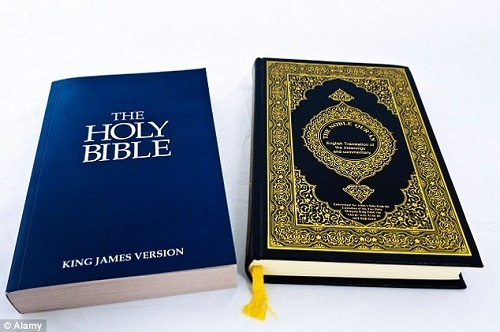
The problem with religious books is that a) they are written by people who might not fully understand what they’re talking about and b) they tend not to allow for any progress.
Morality is a constant conversation among ourselves to address the evolving needs of our communities and what standards we can agree on in order to live together. The needs of a community will constantly change but there are no amendments to divine revelations.
Christians understand that their bible was written by a bunch of people but Muslims believe that their book was written by an actual god. There is no verifiable evidence to support this belief. The good news is that Christians and Muslims also change their understanding of morality over time for the same reasons that everyone else does.
39 notes
·
View notes
